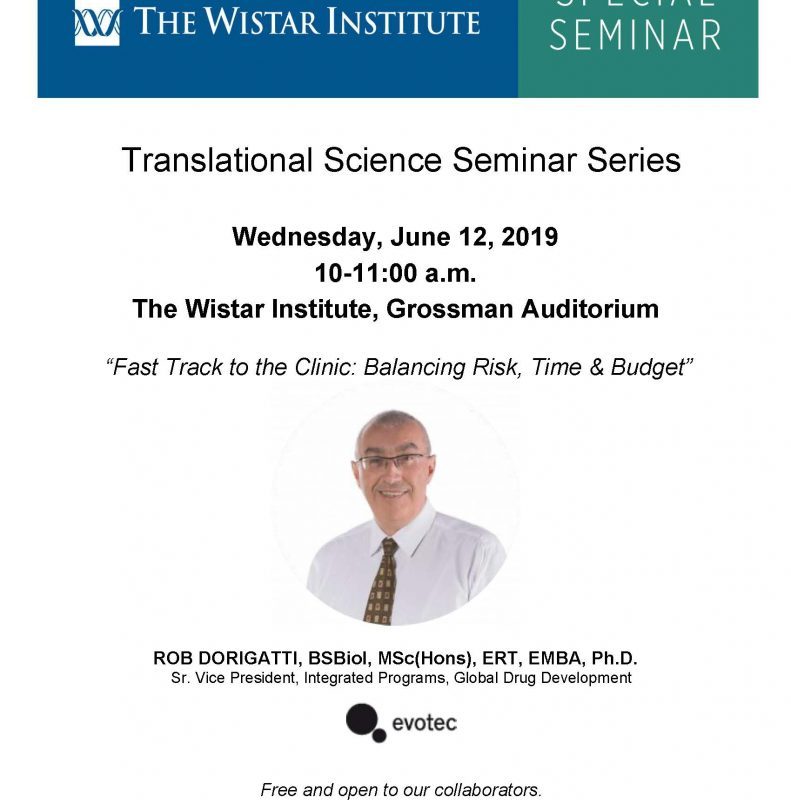On Wednesday, June 12th, the Wistar Institute will host Rob Dorigatti from Evotec as part of their Translational Science Seminar Series. Dr. Dorgotti will be presenting a seminar on requirements for advancing research discoveries through preclinical development and into the clinic. It should be a useful opportunity to learn more about early stage drug development.
For more information, visit wistar.org.
It’s been a busy and productive year for the IRM and its faculty members, including two dynamic and interdisciplinary symposia, an impressive roster of guest speakers, events that engage our students and trainees, and, of course, the research that our members conduct on a daily basis. Below are some of the outstanding highlights from the multiple papers published by our members recently:
We recently reported on a Cell paper published by Hongjun Song and Guo-Li Ming in the UPenn Perelman School of Medicine Department of Neuroscience, with others. Their labs made a discovery regarding the embryonic origin of adult neural stem cells in the mammalian hippocampus, which is integral to the generation of new neurons. Read more here: A common embryonic origin of stem cells drives developmental and adult neurogenesis
Andrew Vaughan, an Assistant Professor in the Department of Biomedical Sciences in the School of Veterinary Medicine, recently identified solitary chemosensory cells, AKA tuft cells, arising ectopically in the lung during regeneration after influenza infection. While not stem cells themselves, these cells have dramatic paracrine effects on differentiation and proliferation of adjacent epithelial progenitors cells. Read more here: Development of solitary chemosensory cells in the distal lung after severe influenza injury
Kenneth Margulies, Professor in the Perelman School of Medicine Department of Medicine, recently developed with colleagues soft elastomeric material with tunable stiffness that spans the range of tissue stiffness observed in normal and diseased heart tissue. They used this material to explore effects of extracellular matrix stiffness on the maturation, size, signaling and gene expression of iPSC-derived cardiomyocytes. The magnetically-tunable elastomer can also be incorporated into 3-dimensional microtissue constructs, making this biomaterial a potentially powerful and versatile tool for studying mechanobiology of stem cells and other cell types. Read more here: Tunable and reversible substrate stiffness reveals dynamic mechanosensitivity of cardiomyocytes
Dr. Nancy Speck, Chair and Professor of Cell and Developmental Biology, and Program Co-Leader in the IRM’s Hematopoietic Stem Cells program, was recently elected to the National Academy of the Sciences. Dr. Speck’s career has included significant discoveries concerning mutations in the proteins RUNX1 and CBFβ, both associated with leukemia.
She is also co-leader of the Hematologic Malignancies Program at the Abramson Cancer Center and is an investigator in the Abramson Family Cancer Research Institute. Our enthusiastic congratulations go out to Dr. Speck!
Read more at Penn Today…
In a newly published paper in Science, IRM member Patrick Seale and others reveal a new discovery regarding the process by which mesenchymal progenitor cells create new adipocytes. Using single-cell RNA sequencing, Seale and colleagues identified a hierarchy involving progenitor cells that express a protein (DPP4) which gives rise to two distinct types of adipocytes. This finding has potential therapeutic applications in treating some metabolic diseases. Read more at Science…

